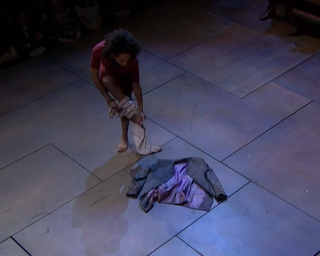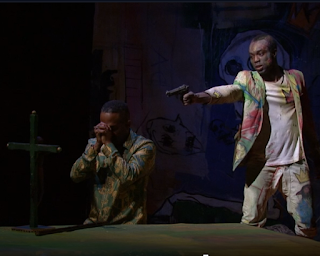Godwin's 2016 RSC production: Act Four
 |
| Ophelia makes Polonius 'present' in the absence of a body |
This is the shortest act of the production at just 28 minutes, but is full of pace and action. The stage is filled with ever-changing movement. Increasingly sinister and ominous music between scenes contributes to the building sense of threat, and the movement to different locations seems almost seamless; as though we are running through the castle with the characters. There are instructions, letters, machinations, plotting.
Hamlet's arrest by a guard is very physical: he is thrown to the floor in a half-nelson submission hold. His insolent foot tapping and movement, and loose-limbed rebellious mocking of Claudius get the audience on side and there is much laughter - but his reactions seem those of a man who has run out of options and has nothing left to lose. Everything about Essiedu's appearance and manner is subversive; down to his shabby clothing and turned-up trousers - in such contrast to the costume of everyone else at court. But, hands bound and alone he presents a different manner, emphasising that much of what has gone before is indeed an act. The soliloquy as he prepares to depart for England suggests that events are much bigger than his personal narrative alone, and that he is bound by a moral duty to act in the interests of the people of Denmark.
The levels used on stage are interesting in this scene. The messenger appears above, as though the castle fortresses are being penetrated. When Laertes is air-dropped in as though by helicopter, the feeling of Claudius being bombarded from all directions is increased. Colour gradually bleaches from the stage through shifting lighting of the cyclorama, as all hope of peaceful resolution is leeched away.
Ophelia's appearance is shocking: her mental disintegration reflected outwardly in her clothing and hair, as well as through her unpredictable screeching and hurling herself towards people. At moments it is as if she is trying to seek her father through the ground. In the absence of a body to mourn, she strips off her outsize clothes to create the image of her father on the ground. Polonius' 'empty' presence dominates the stage for the rest of the act. Ophelia next appears walking above the stage as a lonely, isolated figure in silhouette before we hear news of her death from Gertrude, now herself muddied and barefoot as though she has been part of the rescue mission to pull Ophelia's body from the 'weeping brook' (IV.vii.174).


Comments
Post a Comment